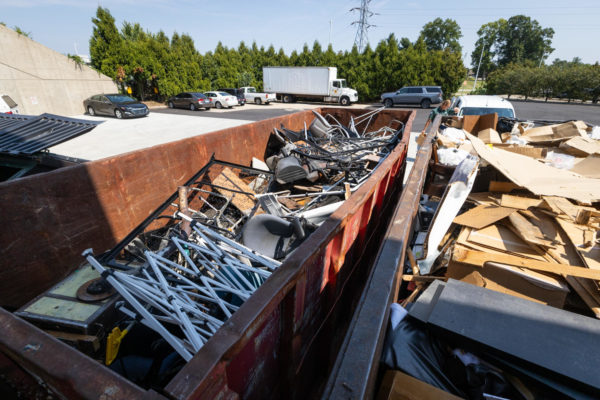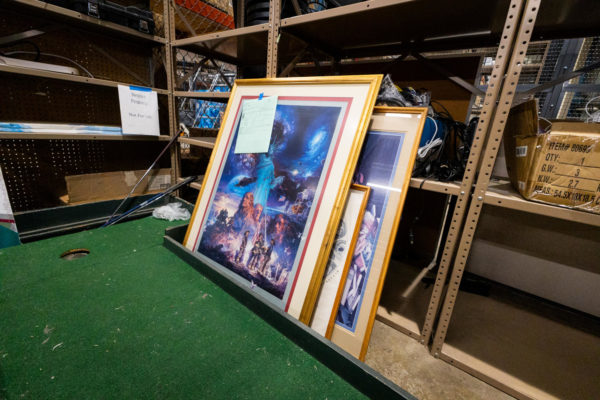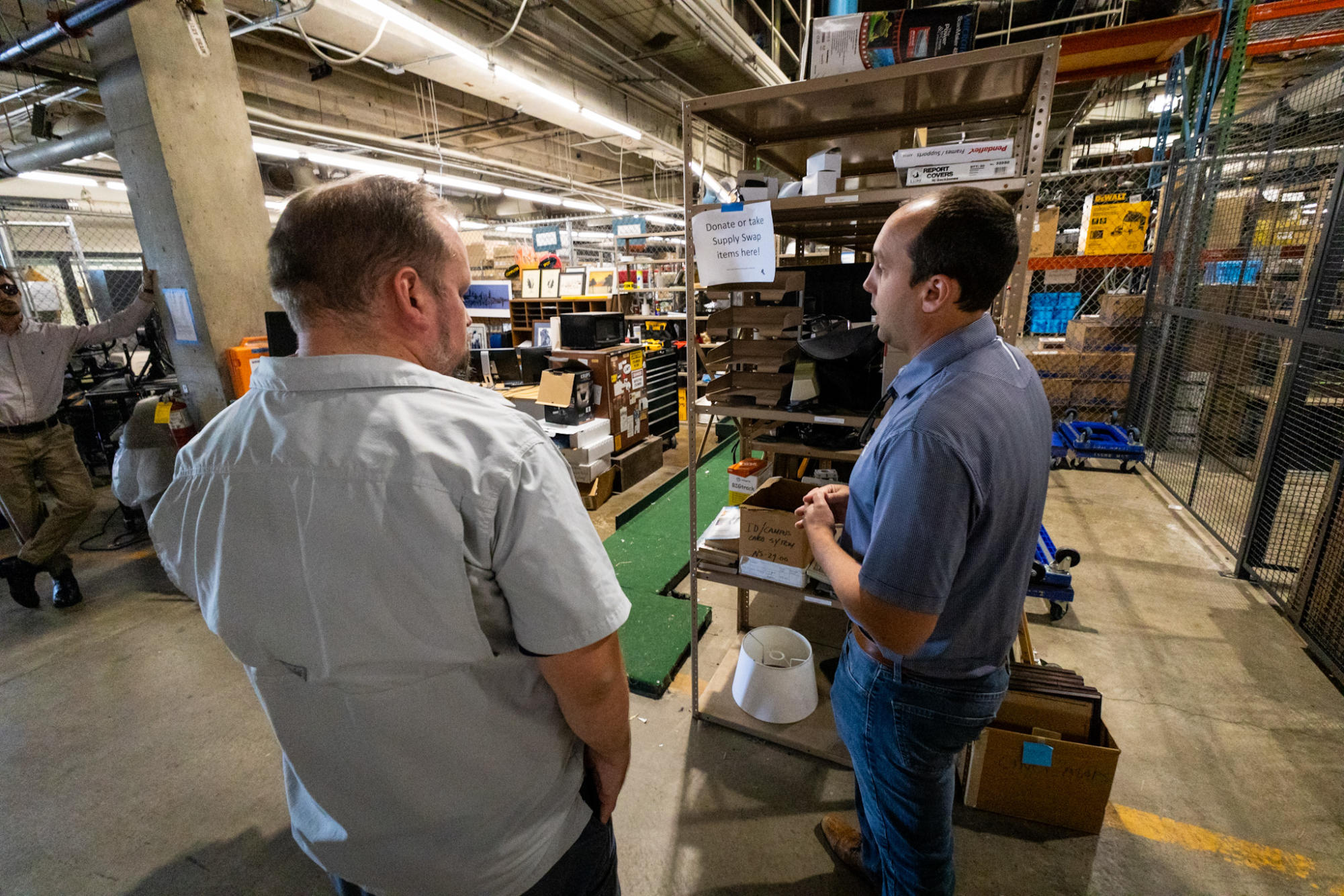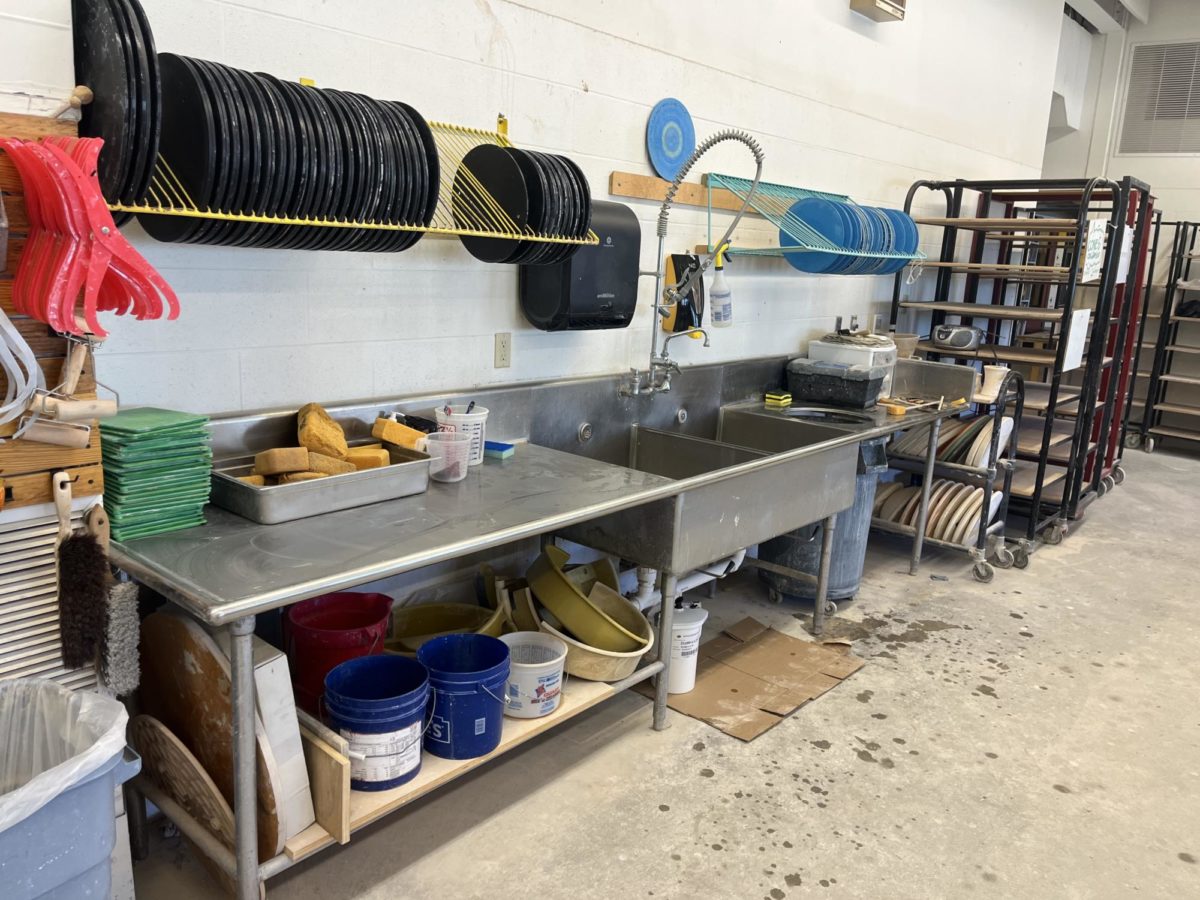Beside the main entrance of Steely Library on Louie B. Nunn Drive, bordered by tall hedges and freshly landscaped flower beds, is the central loading dock: home to the Surplus Property warehouse.
Within this little-known campus gem and division of the university’s Procurement Services Department are droves of miscellaneous items—clunky desks, tacky office chairs, framed pictures, electronic cords, kitchen equipment and more—that have lived out their utility in the eyes of university departments but are destined to be rehomed.
How it works
Surplus Property is governed by a set of university and state-imposed policies that order departments to report when university property is obsolete or no longer needed. The items are brought to the Surplus Property facility to await their fate.
Items initially bought by the university for $2,500 or more are inventoried and tracked throughout their life cycle, according to Eli Baird, manager of Procurement Services. When items with the high price tags are no longer needed, they are inventoried by Surplus Property staff to ensure proper recordkeeping of NKU’s high-end equipment, he said.
All merchandise obtained by Surplus Property is given a one to two week viewing period where university employees can claim the property and have it transferred to their department. This elongates the lifespan of university property, saving the university expenses on new equipment and trash fees, said Baird.
Items are then posted on liquidity services marketplace GovDeals, where items can be bidded on for purchase or bought outright at a fixed cost.
Metal and electronic items that don’t sell are scrapped for recyclable material and picked up periodically, adding another modest stream of revenue to the operation, said Baird.

Only after all means of rehoming or recycling an item are exhausted are items sent to the landfill.
“We’re big on sustainability,” said Baird. “A dollar is better than things just going in the trash.”
This process, if tedious, generates additional revenue for the university’s general fund while promoting sustainability and providing suitors access to affordable items, said Baird.
From chaos to order
When Baird, who used to work in Parking Services at NKU, transferred to Procurement Services in September 2022, the Surplus warehouse was in a state of madness, he said. He was tasked with reining in the disarray.
He brought on a student worker, Joe Andrews, to serve as a surplus specialist. It’s Andrews, said Baird, who is the legs of the operation.
Andrews, a self-proclaimed nontraditional student, has earned a Masters of Public History at NKU. His wife works at NKU, so he takes advantage of tuition credits offered to NKU employees and continues taking other classes.
Andrews is responsible for most back-room duties: cataloging surplused items, listing them on the online marketplace, tagging items when they’re sold and coordinating pickup times with buyers.
Coordinating pickup times with buyers is one of the hardest parts of the job, said Andrews. He spoke in puzzlement about how a buyer from South Carolina agreed to make the ten-hour jaunt to pick up a set of kitchen equipment.
Next to the wide l-shaped desk in the warehouse’s office area is a rickety mini-putting green with flecks of dust and lint scattered on its surface. It’s been lying in the warehouse since before Baird joined the team, and they seem to be in no rush to clear it out.

“We keep that there so Joe can work on his putt when he gets a break,” joked Baird. “He’s still figuring out what we’re gonna do with that.”
Everything in the warehouse is nicely organized. Related items are stored together and consolidated for accessible browsing. It wasn’t always like this.
Surplus Property’s operations were put on hiatus for a period while Procurement Services revised its policies and inventory procedures; the COVID-19 pandemic came on top of this, amplifying the effects of the backlog, said Baird.
With work back in full-swing, the new protocols and revamped team are keeping things orderly.
One of Andrew’s first ideas when coming on board was creating an Instagram account to expand the office’s outreach. Since opening the account, which currently has over 170 followers, the service has attracted more visitors, Andrews and Baird agreed.
For ‘anyone and everyone’
When Emma Prostko, a fourth-year visual communication design student, moved into a new apartment with her roommates this summer, they were looking for a storage fixture to put their jackets and other belongings in when they walk in the door. Prostko’s recent discovery of Surplus Property’s new Instagram account sprung to mind as a place to look.
A three-door locker set posted on the auction website fit what they were looking for. It also piqued their taste for nostalgic decoration ideas. Now, the unwieldy, school building-esque lockers sit in the group’s common area—emblazoned with stickers—each roommate having their own locker to personalize and use as desired. They bought the lockers in an auction for three dollars.
“Instead of having a coat closet out in the common area, we were like, ‘that might be a little bit cuter,’” said Prostko.
Cost-efficiency is a commonly cited merit of the resource.
Ben Huber, shop technician and project coordinator in the Sculpture and Ceramics program, browses Surplus Property’s inventory regularly throughout the year to find equipment like tables, chairs and shelves to meet the program’s needs without draining their lean operational budget.
The Sculpture and Ceramics budget has been distilled in recent years to be composed mainly of funds generated through student-paid class fees, said Huber, who oversees the acquisition and maintenance of the program’s materials. He tries to allot as much of the limited budget towards craft materials that enhance the learning experience. Getting practical items, like furniture, for free through Surplus Property enables them to stretch their budget further, he said.
“I try to make sure that those class fees are going directly to material they’re going to take home after, like materials they’re going to use for projects,” said Huber.
One of Huber’s best finds from Surplus Property was a mammoth stainless steel sink with counter space and under-shelving. It was an upgrade from the small vinyl countertop and kitchen-style sink it replaced, practically tripling its counter space while providing industrial quality suited for the dusty environment.
While modest facility improvements aren’t always glamorous, the practical and budgetary impacts are leveled to make a difference for students, said Huber.
Surplus Property is for “anyone and everyone,” according to Baird. As the resource brings in visitors from both on and off campus, more and more items are getting a second chance.




